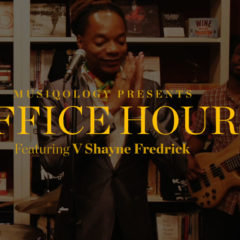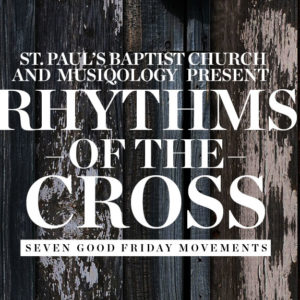Featuring new voices from academia and beyond, Fresh Wax is MusiQology’s way to provide contributions from academics, artists, and writers at large. This week’s writer, making his MusiQology debut, is Martin Edward Connor.
What follows is a hypothetical review of Princeton doctoral candidate and composer Caroline Shaw’s 2012 piece “Partita for 8 Voices,” which won the 2013 Pulitzer Prize for music. This review could have been written—but wasn’t.
If we listen technically, Shaw’s vocal music—typically positioned as “classical”—might be reframed in an altogether different way: “Partita for 8 Voices” contains much of the vernacular of the genre of rap. This review considers that reframing.
Shaw has been called “the future of music,” but many of her compositional choices in “Partita” and elsewhere might be, one could say, influenced in ways that go unrecognized by the people so intent on showing how singular she is. This “review” sets her into conversation with these overlooked cultural forces, re-envisioning her as part of an altogether different cultural conversation. It thus brings to the forefront the issues that such a performative borrowing might reveal: When Kendrick Lamar raps, he is denied his rightful acclaim. When Caroline Shaw “raps,” institutions see her, recognize her, and award her.
The Pulitzer citation lauds Shaw’s shows work as “…a highly polished and inventive a cappella work uniquely embracing speech, whispers, sighs, murmurs, wordless melodies and novel vocal effects.”
What’s unique or novel about that?
Retrospective: Shaw’s “Partita” Flows Hit Just As Hard 4 Years Later
April 15th, 2017 marked the four-year anniversary of emcee-producer Caroline Shaw capturing the Pulitzer Prize, which had dastardly managed to elude 2Pac’s 2Pacalypse Now, Notorious B.I.G.’s Life After Death, and even Aceyalone’s appropriately-titled The Book Of Human Language before her. Rarer than a platinum plaque and older than the GRAMMYs, the Pulitzer made Shaw the first lyricist to have flows that were tight enough to land her alongside past honorees like Copland, Ives, & Ellington. “Partita for 8 Voices” was an instant classic in conversation with the classics.
Shaw, for those not in the know, is a violinist and the newest lyricist out of the budding scene of Princeton, New Jersey. Born in 1982 in North Carolina and based in New York City, Shaw would have come up during the golden age of rap: 2Pac was still vying for the thickest flows with Notorious B.I.G. back then. Shaw dug the golden age of Austro-German symphonists, like Mozart and Brahms in the 1700s and 1800s, but it was a different kind of West that created her big break into the mainstream—Kanye West (who else?) released a remix of the 808s and Heartbreak track “Say You Will” featuring Shaw in October 2015. She’d already taken home the Pulitzer hardware, but this collaboration was important: rap recognized rap.
To those who might not think of Shaw as a rapper, consider the following connections: The vocal feel of tracks like “Allemande” and “Passacaglia” recall predecessors like Mobb Deep’s “Just Step [Prelude]” The Roots’ freestyle “@ 15,” and OutKast’s “Nathaniel.”
“But wait,” you might say. Shaw doesn’t rhyme, and rhyming is one of the important characteristics that sets rap apart. In actuality, by declining to feature such a common form of wordplay, Shaw weaves together disparate powerful threads in the genre’s history, like that of Phonte’s second verse on Little Brother’s 2003 track “Whatever You Say,” or the spoken word approaches of everyone from André 3000 on “Return of The ‘G’” to the “Comment No. 1” of early hip-hop progenitor Gil Scott-Heron.
Perhaps an emcee like Shaw winning a Pulitzer is enough to paper over raw feelings after Kendrick Lamar failed to overtake Taylor Swift in the GRAMMYs race a few years ago and Beyoncé failed to upend Adele’s own march to the award lectern this past year. Or at the very least it might be a sign of progress—the slow-moving institution working towards its Moonlight moment.
[The cover art for West and Shaw’s “Say You Will” remix.]***
So returning to the present moment, the question has to be asked: Why are we calling Shaw a rapper in the first place? What should we do with music that has all the earmarks of rap, but originates in a different space? In the above review, “flow” might have been used in place of “melody;” “ghostwriter,” instead of “libretto;” “rapper,” instead of “composer.” What would these substitutions mean?
Context matters. For instance, slam performer Saul Williams and rapper Kanye West both write poetry that rhymes, but we can’t judge them with the same criteria because their respective art mediums and the cultures they inhabit are so different. This review intentionally suggests the possibility of a fundamental misunderstanding of a work of art. If we judge Saul Williams for the complexity of his rhymes, and Kanye West for his improvisational style alone, then both will end up coming up short. If we appraise Shaw without proper consideration of her influences and contexts, our reading is woefully shallow.
The many alignments between “Partita” and the rap genre beg a series of cascading questions: Why did no one use the vocabulary of rap to describe her music when it fits so accurately? Why did she win an award for a “unique” musical composition whose building blocks have been found in the rap genre for decades? Why are other rappers so seldom in the conversation for the cultural establishment’s most prestigious awards?
In dealing with such tricky questions, there are almost never any straight answers. However, the fact still remains, even if the reasons for why are varied and versatile: a misidentification of what this author sees as a case of rap music with quasi-classical music occurred in the public eye for all to see. With this in view, a fair analysis might be more concerned with what the consequences of such a severance are, rather than the reasons behind such a severance.
The Pulitzer committee’s failure to address Shaw’s work in a proper context is symptomatic of a larger problem—white artists borrow from (or “are influenced by,” depending on how generous you’re feeling) black art, and the critical apparatus fails to recognize that connection. Like Claude Debussy and jazz harmony in the early 20th century, John Cage and jazz improvisation in the mid-20th century, or the whitening of Chuck Berry’s rock and roll, the Euro-American system co-opts black musical vernaculars and black influences. And the next phase seems to have arrived: Caroline Shaw’s Pulitzer might be seen as the newest instantiation of what Susan McClary called “the pervasive African-Americanization” of “twentieth-century musical culture.”
To be sure, a popular, transnational genre like rap would never be incomplete without a Pulitzer; if anything, gatekeepers like the Pulitzer might need rap more than rap needs them. But the unwillingness to call Shaw’s work what it is harkens back to a time when rap was not considered actual music.
And that is the problem here. Shaw may be faultless, but the arbiters of prestige like the Pulitzers and the GRAMMYs continue to get in their own way. It might be best for rap listeners, artists, producers, scholars, journalists and members of this broader community to organize and actively work to make the Pulitzers and GRAMMYs irrelevant. But these types of awards matter, and until we develop a more egalitarian way of discoursing around music, these types of reviews—which acknowledge the full spectrum of a work’s influences—will remain solely hypothetical.
Martin Connor is a music teacher and writer from Philadelphia, PA, with a music degree of high distinction from Duke University who is currently studying for a master’s degree at Brandeis University. His research focuses on the vocal melodies of the rap genre. He is the founder of RapAnalysis.com and has contributed freelance articles to HipHopDX and Complex. He has also had his work appear in Cambridge University’s Popular Music journal and the anthology Eminem & Rap, Poetry, Race. He has been featured on Harvard University’s The Hypertext research project, directed by Harry Allen, teaches rap lessons online through the music school LessonFace, and has authored a book, The Artistry Of Rap Music, (McFarland), scheduled for release in late 2017. He welcomes all comments, compliments, insults, and restaurant suggestions at mepc36@gmail.com.



 Share On Facebook
Share On Facebook Tweet It
Tweet It








